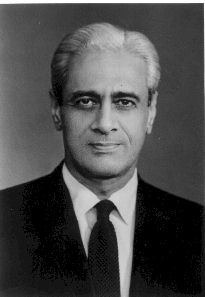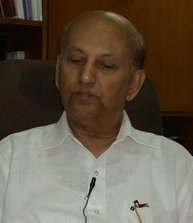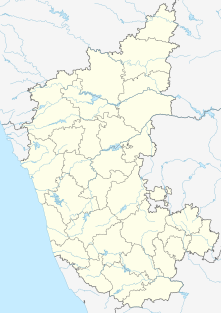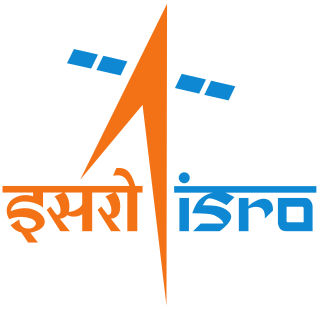
Satish Dhawan was an Indian mathematician and aerospace engineer, widely regarded as the father of experimental fluid dynamics research in India. Born in Srinagar, Dhawan was educated in India and further on in United States. Dhawan was one of the most eminent researchers in the field of turbulence and boundary layers, leading the successful and indigenous development of the Indian space programme. He succeeded Vikram Sarabhai, as chairman of the Indian Space Research Organisation (ISRO) in 1972.

Krishnaswamy Kasturirangan is an Indian space scientist who headed the Indian Space Research Organisation (ISRO) from 1994 to 2003. He is presently Chancellor of Central University of Rajasthan. He is the former chancellor of Jawaharlal Nehru University and the chairman of Karnataka Knowledge Commission. He is a former member of the Rajya Sabha (2003–09) and a former member of the now defunct Planning Commission of India. He was also the Director of the National Institute of Advanced Studies, Bangalore, from April 2004 to 2009. He is a recipient of the three major civilian awards from the Government of India: the Padma Shri (1982), Padma Bhushan (1992) and Padma Vibhushan (2000).

Mylswamy Annadurai is an Indian scientist working as Vice president for Tamil Nadu State Council for Science and Technology([TNSCST]) . Prior to taking this assignment he was with Indian Space Research Organisation and served as Director, ISRO Satellite Centre(ISAC), Bangalore.. During his 36 years of service in ISRO he had some of the major contributions including two of the major missions of ISRO namely [Chandrayaan-1] and [Mangalyaan]. Annadurai has been listed among 100 Global thinkers of 2014 and topped the innovators list. Annadurai and his works are mentioned in 10th standard Science Text Book of Tamil Nadu.

The Department of Space (DoS) is an Indian government department responsible for administration of the Indian space program. It manages several agencies and institutes related to space exploration and space technologies. The Indian space program under the DoS aims to promote the development and application of space science and technology for the socio-economic benefit of the country. It includes two major satellite systems, INSAT for communication, television broadcasting and meteorological services, and Indian Remote Sensing Satellites (IRS) system for resources monitoring and management. It has also developed two satellite launch vehicles, Polar Satellite Launch Vehicle (PSLV) and Geosynchronous Satellite Launch Vehicle (GSLV), to place IRS and INSAT class satellites in orbi
The Liquid Propulsion Systems Centre (LPSC) is a research and development centre functioning under Indian Space Research Organisation. It has two units located at Valiamala, in Thiruvananthapuram of Kerala, and Bengaluru of Karnataka. LPSC is augmented by ISRO Propulsion Complex at Mahendragiri of Tamil Nadu.

G. Madhavan Nair is the former Chairman of Indian Space Research Organisation and Secretary to the Department of Space, Government of India. He has also been the Chairman of the Space Commission and Chairman of the Governing Body of the Antrix Corporation, Bangalore. He was Chairman of the Board of Governors of the Indian Institute of Technology Patna until he stepped down due to his involvement in a controversial deal relating to sale of radio spectrum bandwidth involving Antrix. He was subsequently barred from holding any government positions.

The Master Control Facility (MCF) is a facility set up by the Indian Space Research Organisation (ISRO) in the city of Hassan in the Indian state of Karnataka. Established in 1982, this facility is responsible for monitoring and controlling geostationary and geosynchronous satellites launched by ISRO. This was the only Master Control Facility of ISRO till another one was established in Bhopal in 2005.
Dr. S. K. Shivakumar is an Indian scientist who was part of the team that developed the telemetry system for Chandrayaan-I, India's first lunar exploration mission. A native of Mysore in the state of Karnataka, he was responsible for designing the deep space communications equipment. Shivakumar was involved in the development of the 32-meter dish antenna that can communicate with satellites millions of miles away. He has served as director of ISAC and ISTRAC, two centres of Indian Space Research Organisation.

Koodli Nanjunda Ghanapathi Shankara was a space scientist from India. He was the Director of ISRO's Space Applications Centre (SAC), Ahmedabad and ISRO Satellite Centre (ISAC), Bangalore and is now working as a senior scientist in ISAC. He was the Director of Satellite Communications Program Office and Program Director, INSAT, and was looking after overall planning and direction of communication satellite program. His work in the field of transponder design and development led to a boost in India's communication satellite technology.
Thekkethil Kochandy Alex is an Indian space scientist. He was the director of the ISRO Satellite Centre (ISAC) of Indian Space Research Organisation (ISRO) (2008–2012) and Member, Space Commission. He specialized in electro-optic systems and satellite technology. Starting with the first Indian satellite Aryabhata he has been responsible for the sensor systems in all the Indian satellites. Under his leadership the Laboratory for Electro Optics Systems (LEOS) was established in 1993 and from the inception he was its director till 2008. He was conferred "Dr. Vikram Sarabhai Distinguished Professorship" in 2011.
Parivakkam Subramaniam Veeraraghavan is a well known space scientist and rocket technologist of India. He has served as the Director of Vikram Sarabhai Space Centre (VSSC), Thiruvananthapuram, Kerala and as the Director of ISRO Inertial Systems Unit (IISU), Thiruvananthapuram. One of the most senior scientists at Indian Space Research Organization (ISRO), Veeraraghavan is known for his contributions to launch vehicle technology, especially in the areas of integration & checkout and Inertial Systems of ISROs launch vehicles. Presently, he is holding the honorary position of Prof. Vikram Sarabhai Distinguished Professor in VSSC, ISRO since January 2013.
M.Y.S. Prasad is an Indian scientist and the former director of the Satish Dhawan Space Centre Sriharikota Range (SDSC-SHAR). He is currently serving as the Vice-Chancellor in India's one of the top private university, Vignan's University located in Guntur district of Andhra Pradesh.
Prem Shanker Goel is an Indian space scientist, former secretary at the Department of Ocean Development, Ministry of Earth Sciences, Government of India and a former director of Indian Space Research Organization. He was honored by the Government of India, in 2001, with the fourth highest Indian civilian award of Padma Shri.
Nilamber Pant is an Indian space scientist, a former member of the Space Commission of India and a pioneer of satellite based communication and broadcasting in India. He served at the Satish Dhawan Space Centre and the ISRO Satellite Centre before becoming the vice chairman of the Indian Space Research Organization (ISRO). The Government of India awarded him the fourth highest Indian civilian honour of Padma Shri in 1984.

Kailasavadivoo Sivan is an Indian space scientist and the chairperson of the Indian Space Research Organization. He is the former Director of Vikram Sarabhai Space Center and Liquid Propulsion centre.
Madhavan Pillai Ramakrishna Kurup was an Indian rocket scientist and the founder of the first solid rocket propellant plant in India at the Vikram Sarabhai Space Centre. He is known to have contributed to the successful launching of the Augmented Satellite Launch Vehicle (ASLV) as the director of the VSSC centre in Thiruvananthapuram. The Government of India awarded him the fourth highest civilian award of Padma Shri in 1990.
ISRO Satellite Integration and Testing Establishment (ISITE) is an integrated satellite testing facility established under the aegis of ISRO Satellite Center by Indian Space Research Organisation in 2006. Started with an area of 1000 sq ft. at the time when the Aryabhatta satellite was launched, the testing facility is spread over 100-acre and can integrate and test six satellites of the INSAT class at different stages simultaneously: 2 communications, 2 remote sensing and 2 foreign satellites. The investment on the facility is so far about Rs 220 crore and ISRO plans to make a further investment of Rs 100 crore. The facility has also carried out vibration and acoustic tests of Mars Orbiter Mission (MOM) spacecraft.












